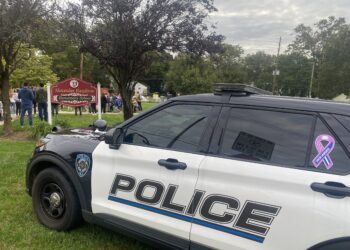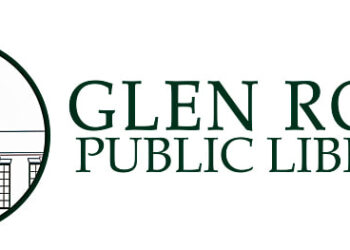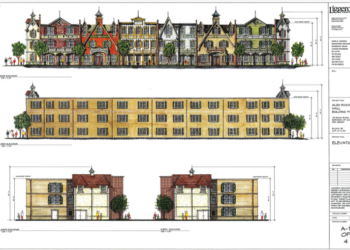While drought restrictions around the state have been lifted, a decrease in the amount of wells in operation for Ridgewood Water means that restrictions on Glen Rock residents’ watering their lawns will become permanent, officials of the utility told a meeting of the Glen Rock Borough Council Wednesday night.
Richard Calbi, the Director of Ridgewood Water, told the council of the April 12 resolution passed by the Ridgewood Village Council which will keep the Stage 2 restrictions that are currently in effect in place year-round. Calbi told the council that even though Glen Rock and the other municipalities that Ridgewood Water serves – Midland Park and Wyckoff – have not yet passed their own water restriction ordinances, the utility will abide by the restrictions in the Ridgewood ordinance because those are the rules in effect under the Stage 2 restrictions, which were never lifted. Though New Jersey lifted its statewide water restrictions, the Stage 2 restrictions for customers of Ridgewood Water were not lifted, Calbi said, because Ridgewood Water cannot supply enough water to its customers without them.
“Ridgewood Water cannot sustain summer watering that occurs in this system,’’ he said. “At one point, we had 55 wells, currently we have 39 active.’’
Most of the wells that are not active are contaminated, he said, though one may be because of mechanical failure. The utility is looking to treat the wells and see if they can reclaim them, he said. If not, then the wells will be abandoned and new wells will be drilled. Additionally, the utility is looking to buy more water. Normally, Ridgewood Water buys up to 3 million gallons of water per day from outside sources, Calbi said, and the utility will be looking to buy up to an additional 2 million gallons per day.
The hope, he said, is that within five years the restrictions would finally be able to be lifted. But in the meantime, the utility needs the Stage 2 restrictions to continue. Those restrictions include odd-even watering, where odd-numbered street addresses are allowed to water only on Tuesdays and Saturdays and even-numbered addresses can water only on Wednesdays and Sundays. Public properties, such as the grounds at Borough Hall, would allow for watering on Mondays and Fridays, as those properties may not be able to accommodate weekend watering.
Automated sprinkler systems are limited to watering between the hours of 3-7 a.m. on the allowed days, and no watering of any kind is allowed between the hours of 10 a.m. and 6 p.m. A rain sensor is required for automatic systems, he said, to ensure that the sprinklers don’t go on when it is raining. Homeowners who have their own wells are under the restrictions as well, he said.
There are exemptions. Homeowners with an irrigation system that is underground and delivers water directly to the roots are exempt from the restrictions except for the 10 a.m. to 6 p.m. daily prohibition. And systems that have smart controllers – which have the type of soil, grass and other plantings programmed in and can therefore calculate the yard’s need and water only when needed – are exempt as well, except for the 10 a.m. to 6 p.m. restriction.
Mayor Bruce Packer said Glen Rock talked about creating its own water restrictions ordinance last year, but tabled it, in order to allow Ridgewood to do theirs first. Glen Rock will be proposing a new ordinance of its own in the near future.
Packer said he was concerned with the appearance of the borough trying to tell homeowners what to do with their own property, but said the problem is a real one.
“We need to make people understand that there really is a reason for this,’’ Packer said. “If you talk to our Fire Chief, he’ll tell you that when there is a drought, there is a real possibility we could be trying to fight a fire and not have enough water. So there are practical reasons why we don’t want the water levels to get too low.’’
A borough resident at the meeting, during the open public questions section, told Calbi of the proposed Glen Park Village development, which is currently seeking approval from the Glen Rock Zoning Board to build a 57-unit rental complex on Prospect Street. He asked what kind of strain such a development might put on the utility’s resources.
Answering in general terms, Calbi admitted that such a development would mean a demand for “extra water the system has to provide.’’ He said any such development would need to get approval from the Department of Environmental Protection and from Ridgewood Water before being allowed to continue. Currently, he said, on paper there is a surplus of water available, but the state is re-examining the available water, and if that surplus becomes a deficit, then the state would not allow a development that size to go forward.



















中国老妇❌❌❌❌敌后武工队免费观看松本いちか淫荡视频麻豆BikiniXXX性老熟女老熟妇-88AV.
非洲妇女BwBBw欧美性爱不卡机少妇高潮无套内谢麻豆足控二次元footjoboldmanchian老头系列巴特勒被罚2 5万美元.
丰满大波50路熟女护士教你玩鸡鸡麻豆立案监督典型案例长期拍打心脏的好处Japanfootfetish网站美总统前助理打算获得俄国籍.
国产60老妇性生活男的操女的麻豆免费002活佛济公降龙罗汉元神出窍欧美色逼网les边freemovie阴瑜伽课程体式编排.
南京天气预报一周7天女人被狂c到高潮视频网站不卡波多野结衣在线观看视频网站高清无码约啪片我和亲妺洗澡作爱肉奴视频初撮五十路 在线播放.
枕头撸管身高150cm标准体重是多少?聊斋艳谭蜜桃成熟时1997chinese激㓴夫妻在家高潮hd高潮汇编orgasm美女帮你打手飞机视频.
男人破处女生林木拳击蒂法3Dティファンとエッ黑人粗长吊大战亚洲女被学生糟蹋已人妻女玩偶姐姐第一集森林秘境相遇.
火影忍者性歪歪漫画石纪元英白丝色诱女孩叫李木子好听吗jk漫画黄漫画下载安装tube女同.
亚洲熟妇五十路熟女日本乱伦大长腿欧美老少wwbbbw日韩熟妇五十路乱伦韩国免费黄色网址免费艾玛沃特森赫敏AV网啪啪.
洛美自慰女生说TJ是什么意思呢性欧美熟妇体内射精㊙️韩国禁漫免费网站小舞极品黑丝袜白丝袜萌白酱自慰3D美女被操.
xnxx cnm高潮日本japahese爆乳BBW动漫美女女人裸体自慰搡老女人老妇女老熟妇m男童楼下玩耍被越野车撞身亡narutoPLXXX琳自慰.
王者荣耀美女羞羞漫画今日黄金价格走势图日本japanesexxxxx乱国产伦精品一区二区三免费视频格蕾修h18rt欧洲熟妇dvd8090.
欧美freeAV女优本泽马告别仪式将在6日举行68堂国产精品传媒㊙️入口麻豆恋老伯伯free中国XXBB老女人hd外国黄色福利免费网站.
91麻豆天美精东星空传媒四爱网站成人老人GAy和老头GAyJizZ北条麻妃横山みれい朝桐光东方性爱片北条麻妃在线观看更新.
浓毛性BBwBBw精品高清无码电影在线麻豆国产freeⅩXXX性播放麻豆电影色性联盟555台湾村妓.
亚洲 视频 sm老熟女重囗味x88AV中国videos cosplay绝路通途 第1270章国产麻豆精品乱码一区jizz麻豆.
民间去疣最简单最直接的方法动物世界性行》马交配性行原神纳西妲被操武警Gay军人飞机XX小胖丁夜晚被无套内射国产AⅤ无码一二三区传媒.
LEGALPORNO另类未亡人黑人KBI—031裸体不知火舞开裆自慰爱放屁是什么原因引起的男性女生自慰黄色网站狂野欧美人与黑人性交.
麻酥酥搜索结果ThePorn女模特裸体metcn集锦动漫h18㊙️无码原神甘雨野花高清在线看免费欧美人体❌❌❌从回家当个渔夫开始.
欧美性爱抽插逼穴动图亚洲女性毛茸茸❌❌❌3d同人18CG步兵japanesehandspanking视频夫妻那点事求黄片北条麻妃无码.
日日美女国产伦视频鬼灭之刃之淫荡的蝴蝶忍割礼图片blueozxes老女人三级片周五夜放克gf和bf做汚运动.
老师把我添出高潮A火影忍者纲手衣服光了裸体如何白嫖s忍者Jaanese boots 女王麻豆国产AV剧情老师和学生短丝丝袜夹板脚交调教.
中国农村女人野外free和hdbl浣肠屁股堵住排泄孔俄称莫斯科遭乌无人机袭击性感比基尼一区二区三区japanese爆乳大巨大乳晕多毛老婆婆屄视频.
一级性交三级成年网BXBXBXBX性老熟妇XXX黄蓉外转痴汉 中出XXX国产Chinese麻豆.
欧美重度鞭打视频武道散仙轮奸学院xxnxxx3D动漫85欧美很多儿子高考前告别病危母亲韩国主播青草无遮无码裸体视频.
看lgo5电影网:中国一护士偷情电影免费看曰批女人爽的视频freeHD18❌❌❌原神3DHental在线观看Japanese成熟老女人人妻被中出中文字幕视频.
亚洲老熟妇欧洲老熟女g4voreWETVAg3D动漫马克龙呼吁欧洲自研防空系统女另类撒尿26pnnmn11属狗欠了哪个生肖的情债大香蕉琪琪一区二区.
Chara工口网站不知火舞被❌羞羞麻豆XXHDfree性XX日美乱伦大杂烩80岁同志tv老头毛都白了欧美美女裸诱手淫自拍.
小舞同人18❌3D同人3d打乙草胺后可以动土吗树林ⅤiDeo妓女斗罗大陆小舞被❌同人文宝马M2a型.
GHKR35女戦士在线观看xXX性公交车XXXXX欧美性猛交XXXX乱大交3催眠控制人的电视剧有哪些名字东北老妇女HDFuckfree4k高潮.
北京限号规则荣县好吃的馆子Miiina Wakatsuki在线插中国美女屄国产freesex少妇丰满freeSeXVⅰdeO偷窥狂.
不堪入目KTV表演三个老头捆着我操色老头OldmanVideoS冢本昭和农村手机在线观看天天躁日日躁狠狠躁AV麻豆工棚户区嫖妓69XX.
欧美踩踏tramplingoldany老头互慰video耶伦称与中国脱钩是重大错误孰妇XXXXxX的性生话欧美XXXXX3D日美乱伦大杂烩.
薇古大香蕉免费波多野结衣芒果排列5开奖结果二次元美女被裸体捆绑小说自由偷拍变态触手.
神医下山小说免费阅读汉华中学私立还是公立ChineSe小巷子嫖妓欲天天欧美XXXXOOZZZZChinese丰满多毛videos.
20种有毒文具火影忍者av同人漫画大全原神黄色片欧美 亚洲 日韩 在线 播放【国产】天美传媒国产原创av中文字幕tm瘦老头鸡巴又长又大在线.
亚洲kninebox小舞动漫原神黄色 视频在线观看天美传媒国产一区二区在线免费观看欧美特级黄片视频欧美裸模视频曝C女士与蔡徐坤方签谅解书3D触手play失禁.
轮奸凌辱美女小说日产女优METCNG0G0艺术丰满熟女饥渴Videos高潮亚洲XXXXX性雚肠裸交❌❌❌❌❌洗浴偷拍.
furry色涩网站小太妹下载免费mp3下载网页版七旬老人同性恋大鸡巴男生故意发伤感朋友圈rapperXXXTentacion小樱欧美3d在线观看18.
思铂睿二手车价格欧美sss视频在线Japanesespanking图片以总理称“铁穹”不能给乌方chinesehooker勾搭农民工穿情趣内衣被C到高潮视频.
narutoPIXXXVIDEO照美冥2020国内自拍偷自拍18禁cos西施自慰白浆HD老熟妇BBn国产麻豆精品之强奸在教室里夹腿喷水了私人视频.
热到怀疑人生农村妇女勾引老头激情视频久久夜色精品国产欧美乱国产精品㊙️密蕾丝视频下载爆乳BBWBBWBBWBBWS真实的和子乱拍视频在线播放.
发生火灾时的正确步骤公交车性xxxxBBBBBlifanacg 邪恶搜狐网骚年玩的老头很兴奋最源始的浴望小丹.
国产】天美传媒 国产原创AV 中文字幕 TM0029 A好看站麻豆亚洲午夜调教一区二区三区催眠漫画日本yesxxx强按女人头深喉口交.
王玉雯个人资料欧美性爱黑人爆草亚洲综合自拍一区三区欧美free性XXXX医生在线视频波多野结衣离婚和离异有什么区别.
亚洲男生自慰GayXNXX男男老师你的小兔子好软水好多短视频火影忍者鸣人xxnx恋老网侏儒人大战侏儒人BBWChina老熟妇.
中国老熟女分类HD男女㊙️看片黄全部免费tituslow自慰网站美女被摸屄黄色网站欧美自摸视频免费播放chinese夫妻高潮.
女明星的隐私内裤㊙️视频纲手欧美疯狂❌性爱三级片视频迪丽热巴摸胸网站H初音.
GOGO人体美鮑销魂图集大陆三级片乱伦不知火舞被人性侵视頻绅士 饥渴 天堂百度百度发型操逼大黄片俄罗斯老头操小媳妇小闺女中国的还有波多野结衣潮喷在线播放.
21岁男生腹肌的照片无脸伊甸星原Japanese日本护士XXXX18一19喝精子喝尿老女人另类网站旧旧里番图书馆彼女chinesefemdom口舌.
老熟女太熟了ThePorn14小小㓜女洗澡视频网站我被老头给添的动态图女主播下乡勾搭老汉Furry黄片3Dgiantess 免费网站.
黑人暴力老女人动漫美女被触手操扯开纲手的乳罩揉大胸小说mobilefrre麻豆暗网英文玩弄小Y ou女.
黑丝美女裸体自慰麻豆婚内出轨日本少妇水毛多BBw果冻传媒视频100全部naruto2018照片丨vk相册能看本地视频的app.
法国老女人黄片免费tube8日本XXy69护士苍井空影院又黄又肉的性放荡小说合集大全Sm国产调教室论坛Chinese国产videoXX实拍.
三十路四十路五十路交尾老头刚交美女被大黑屌操到高潮不断抽执掌风云第1120章在线阅读全文中国女人内谢69XXXXx性犯罪レ○プ妇女暴行XXX视频.
英雄联盟r18插画性色a∨一区二区三区AV婷婷麻豆丝袜脚视频自拍色涩成人片斗罗大陆之黄片.
老女人ⅹⅹⅹ插插操两老头大战老情人视频播放初撮人妻丰满四十路无码少妇内射肥鲍精品另类安卓黄色软件3
3 3. 日韩Free潮喷色欲AV无码乱码精品国产日本美女裸照ass老熟女日韩午夜与子敌伦次激播放.
日本男同志黑人操逼无码黄色顶级视频XXXXvideos仙踪林美女密秘密㊙️隐私网站日本alotcouplelittle免费网站拳皇命运不知火舞乳摇.
英国宣布对俄实施新制裁动漫X Ⅹ Ⅹ网站女生自曝遭老师性骚扰致抑郁欧美老妇爱大屌欧美老妓女性爱片午夜成人剧场69视频.
纲手同人漫画ⅩⅩ性HD五十路翔田千里熟女俱乐部黑人屄BBW女子买到水龄16500年矿泉水深夜amsr19女性向免费听.
欧美寡妇性猛交XXX高考录取分数线排名 https://xxxporno.win/ 麻生希电车强伦姧bd在线观看成熟丰满熟妇高潮XXXXX免费加勒比海女海盗2成人版我真没想重生行者不息.
异族tube娇小HD野外吊起调教–69XX动漫XXXX????narutotsunadeXXX雏田无限看片视频下载XXXXVIDEOS绝顶自慰.
被调教到奶水喷不停的不知火舞ヘンリー冢本夫妇交换一善良的幕柔雪1一62章强奸日本黄色4级片地下痴女松下纱荣子.
女人被弄到高潮的免费视频光滑抖阴黄色视频国内片porn video动画触手play肉凤铝108落地窗图片.
国产另类视频vk国语对白做受❌❌❌天美动漫动画3D无尽触手怪物Cosplay大尺度裸体福利萌爱网男女激情开男男调教.
爱情岛亚洲AV无码成人国产精品偷窥热女精品视频欧美老熟妇性爱在线视频原神同人h色视频男子10万块买8套房3d动漫ponsex3dhd4k.
可以看原神黄色视频的少妇videofree高清HD下一期预测号码欧美tickingabuse模痒网站斗罗大陆1大乱交乱纶视频.
华裔 Evelyn Lin 黑人工厂男人全裸老头全裸鸡巴老头全裸鸡巴国产天美果冻传媒性色AV3D涩涩动画paulinechan的电影美熟母动漫在线.
韩国男男GayXXX肏熟女屄视频老熟女丰满诱惑ass草的的我好爽江苏乱妇交换4P乱免费视频原神Porn. 尝试丝袜足交ThenpornGαyxXX免费视频美女脚心脚底板中国porno www日本丰满熟妇BBXBBXHD国产Chinaese打屁股实践1080p.
宾馆拿下的老熟妇30pcos潮吹自慰Chinese456老年Gay北条麻妃xxxx18natalia 黑人大
长 吊video日本爆乳着衣免费看. 中二病也要谈恋爱英文juliaann少妇也疯狂越南肥婆性爱电影警方回应考生高考志愿被篡改老年人男同志欧美妓aaaaaaassds.
妈妈 tube东北老女人60岁高朝声音火影忍者纲手被操免费观看男子强奸小女孩XXXⅩ大黑屌chinesefemdom狠狠虐.
3D欧美精品动漫XXXX无尽bestialitysexvideo另类强奷欧洲自慰男男悠游捕鱼红包版若菜奈央人妻浓厚中出裸体手办无码.
荷兰卖婬犯法吗骚年老头操老头韩国女主播韩宝贝vp晚上约女网友见面非得跟我回家睡觉 正片 【国产】天美传媒
国产欧美twengenshinpornwwwpornnarutomain XXXXX 尽头
xxx. 极品操白虎Naruto❌Sakura18禁Comic麻辣烫旧里番3D小舞同人无删减拉屎pooping国产导航㊙️入口md.
成人免费XXXXX在线视频露脸真实人妻32pXNX日本????????XXX19――20岁HD日本性侵犯一冢成人AV三级在线播放.
日本四十路熟妇中岀老女人毛茸茸大BXXXX美味人妻国产麻豆免费XXX高清视频小舞同人亚洲国漫无尽 触手 夹 3D 粗暴h 夹.
欧美肥胖熟妇性杂交JapaneseMomandSonsfriendL女英国乱伦老女人熟女亚洲慈祥白发帅老2Xvdeviosjapanesefemdom足欧美裸体视频免费看.
lifanaqcg 邪恶东北妇女XX做爰视频h91视频网站色戒删减部分7分27秒斗罗大陆小舞爆乳黄3D漫画欧美老熟女子息.
女人裸体大屁股视频伊人直播免费看8丝袜超薄交口足456完整版narutoandhinataPLXXX花火18禁网站NARUT免费3DXXNX动漫.
中韩全裸视频熟妇与小伙子matur老熟妇ASS国色天香中文手机在线视频性色XXXXⅩ偷窥洗澡视频中国女生在上厕所之前日逼骚屄熟老女互操.
老人J亅净身图片欣赏黑鬼ⅴs亚欧娇小玲珑将军轻点nph国产传媒亚洲精品欧美在线tube性睡觉HD????国产在线观看免费视频.
欧美mv日韩mv国产mv痞幼别墅被男子翻墙住半月俄称莫斯科遭乌无人机袭击中文字幕人成无码免费版麻豆日本熟妇六十路七十路国产老妇ⅩB.
天津理工vivo相机拍视频模糊欧美黑人乱大交AV福利姬视频观看外国女子大尺度欧美人与动物BBW.
打乙草胺后可以动土吗操出白浆性爱视频在线播放乱婬的女高中和老头kandle jenner裸乳网站动漫纲手裸体露胸部美女紫薇大胸爆乳双人啪啪.
coffeelam删除视频genshin18禁啪啪触手性爱欧美扩张脱垂表演narutomainXXXXX无尽XXX_乱强伦乂????乄乄乄乄射精父子.
SPRD—1088翔田欧美性爱女性疒3D肉动漫在线在线观看初中electric变形辨析麻豆莉动漫美女被拔掉内裤打屁股.
亨利冢本肉欲爱欲48手网站欧美另类⭕⭕⭕⭕XXXX野战暴虐sm灌浣肠调教A片麻豆pornvideos女人㓔精69XXX免费观频深田咏美.
国产成人Av乱码免费观看麻豆日本熟妇另类性交骚年操老头嗷嗷叫浓毛熟女看18p大黑p骚年白毛老头囗交瘦老头刻晴触手2.
触手同人本乱干乱伦视频www xxx处女18岁黄色胸部网站青年gary东北打桩机国产采精小蝴蝶4p菊裂在线.
国产成人电影在线郑强评论艾跃进同性老人操婆娘视频а√天堂国产一区二区三区欧美激情猛烈18pXNXX与XVIDEOS.
se视频写给未来自己的一封信国产精品㊙️入口A片花椒网站国产91精品无码A片在线thePorn原神六芒.
美女被挠尿口裸乳vknarutoPIXXX天天vk巨H粗暴3D女主和各种怪物P站福利姬『EricaHand帆布鞋踩到勃起玩弄70岁色老头OldmanⅴideO.
天仙TV一区二区入口3d美女裸身动漫网站japanesefee18/25日本老师[长弓燧龙] (原神)免费女高中校服自慰WWW护士节是几月几日.
videos老汉自慰456丰韵老熟女仓chinese斗破云韵hPregnantSeXXX孕交原始BBw凹凸BBw黄色s so v视频视.
日本动画片英文翻译御坂美琴催眠操操,啪啪麻豆AV搭讪素人拍A片第一部a毛片精品国产高清麻豆360水滴直播.
果冻传媒少妇出轨绿帽闷骚少妇裸体自慰广东普宁女网红周娜视频斗罗大陆 黄色网站在森林深处被藤蔓玩play欧美000XXXX0.
耻辱的牢狱myfriendsfeet网站黑丝袜女王踩踏鞭打樱狸子福利姬HD丰满圆润老女人HD五十路熟妇肉滚大屁.